Cuban policosanol: a natural compound for ischemic stroke treatment
Stroke is among the leading causes of mortality and disability; therefore, it constitutes a relevant health problem. Cuban policosanol presents lipid-lowering, antiplatelet, antioxidant and vascular
[...] Read more.
Stroke is among the leading causes of mortality and disability; therefore, it constitutes a relevant health problem. Cuban policosanol presents lipid-lowering, antiplatelet, antioxidant and vascular endothelium protective properties, all of which give it a comprehensive anti-atherosclerotic effect. This review is aimed to show, analyze and discuss the main preclinical and clinical evidence of the effects of Cuban policosanol on ischemic stroke. Preclinical studies evidenced the anti-ischemic effects of preventive and therapeutic oral treatment with Cuban policosanol in Mongolian gerbils with cerebral ischemia induced by unilateral and permanent ligation of a carotid artery, and in global cerebral ischemia induced by bilateral clamping and recirculation of both carotids; being similar or superior to other anti-ischemic agents. Also, combination therapy with aspirin produced greater anti-stroke efficacy compared with aspirin monotherapy, but being similar to policosanol plus atorvastatin combination. This anti-stroke effect was associated to a serum thromboxane A2 (TxA2) concentrations reduction and prostacyclin (PgI2) increase, leading to a favorable TxA2/PgI2 balance, and also to the malondialdehyde (MDA) and sulfhydryl groups (SHG, lipid peroxidation and protein oxidation markers, respectively) reduction. Cuban policosanol combined with aspirin (standard therapy) improved and benefited patients with prior ischemic stroke in terms of functional and neurological outcomes, in open-label studies and in randomized, double-blind, controlled studies. These beneficial effects on stroke patients were associated with antioxidant and antiplatelet effects of policosanol. Also, the combinations of Cuban policosanol plus aspirin and atorvastatin plus aspirin compared in a clinical study significantly and similarly improved the neurological recovery of patients with ischemic stroke. Cuban policosanol was safe and well tolerated, with no serious adverse events occurring during the trials. In conclusion, Cuban policosanol is a safe and effective natural drug for ischemic stroke treatment, which is supported by preclinical and clinical evidences.
Vivian Molina Cuevas, Ambar Oyarzábal Yera
View:1426
Download:28
Times Cited: 0
Stroke is among the leading causes of mortality and disability; therefore, it constitutes a relevant health problem. Cuban policosanol presents lipid-lowering, antiplatelet, antioxidant and vascular endothelium protective properties, all of which give it a comprehensive anti-atherosclerotic effect. This review is aimed to show, analyze and discuss the main preclinical and clinical evidence of the effects of Cuban policosanol on ischemic stroke. Preclinical studies evidenced the anti-ischemic effects of preventive and therapeutic oral treatment with Cuban policosanol in Mongolian gerbils with cerebral ischemia induced by unilateral and permanent ligation of a carotid artery, and in global cerebral ischemia induced by bilateral clamping and recirculation of both carotids; being similar or superior to other anti-ischemic agents. Also, combination therapy with aspirin produced greater anti-stroke efficacy compared with aspirin monotherapy, but being similar to policosanol plus atorvastatin combination. This anti-stroke effect was associated to a serum thromboxane A2 (TxA2) concentrations reduction and prostacyclin (PgI2) increase, leading to a favorable TxA2/PgI2 balance, and also to the malondialdehyde (MDA) and sulfhydryl groups (SHG, lipid peroxidation and protein oxidation markers, respectively) reduction. Cuban policosanol combined with aspirin (standard therapy) improved and benefited patients with prior ischemic stroke in terms of functional and neurological outcomes, in open-label studies and in randomized, double-blind, controlled studies. These beneficial effects on stroke patients were associated with antioxidant and antiplatelet effects of policosanol. Also, the combinations of Cuban policosanol plus aspirin and atorvastatin plus aspirin compared in a clinical study significantly and similarly improved the neurological recovery of patients with ischemic stroke. Cuban policosanol was safe and well tolerated, with no serious adverse events occurring during the trials. In conclusion, Cuban policosanol is a safe and effective natural drug for ischemic stroke treatment, which is supported by preclinical and clinical evidences.
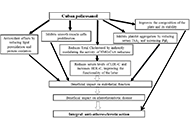 Cuban policosanol: a natural compound for ischemic stroke treatmentOpen AccessReviewStroke is among the leading causes of mortality and disability; therefore, it constitutes a relevant health problem. Cuban policosanol presents lipid-lowering, antiplatelet, antioxidant and vascular [...] Read more.Vivian Molina Cuevas, Ambar Oyarzábal YeraPublished: February 26, 2024 Explor Neurosci. 2024;3:65–79
Cuban policosanol: a natural compound for ischemic stroke treatmentOpen AccessReviewStroke is among the leading causes of mortality and disability; therefore, it constitutes a relevant health problem. Cuban policosanol presents lipid-lowering, antiplatelet, antioxidant and vascular [...] Read more.Vivian Molina Cuevas, Ambar Oyarzábal YeraPublished: February 26, 2024 Explor Neurosci. 2024;3:65–79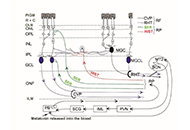 Current state of knowledge on the centrifugal visual system (including the pinealo-to-retinal connection) in mammals and its hypothesized role in circadian rhythmsOpen AccessReviewThe ubiquity of circadian rhythms in living organisms has generally been accepted by researchers over the last century. Indeed, morphology and molecular biology of the circadian clock were described [...] Read more.Viktória Vereczki ... Ágnes CsákiPublished: February 22, 2024 Explor Neurosci. 2024;3:51–64
Current state of knowledge on the centrifugal visual system (including the pinealo-to-retinal connection) in mammals and its hypothesized role in circadian rhythmsOpen AccessReviewThe ubiquity of circadian rhythms in living organisms has generally been accepted by researchers over the last century. Indeed, morphology and molecular biology of the circadian clock were described [...] Read more.Viktória Vereczki ... Ágnes CsákiPublished: February 22, 2024 Explor Neurosci. 2024;3:51–64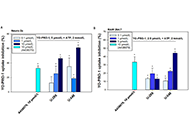 Antinociceptive effect and anti-inflammatory activity of 1,4-naphthoquinones in miceOpen AccessOriginal ArticleAim: The ability of synthetic 1,4-naphthoquinones (1,4-NQs) to prevent adenosine triphosphate (ATP)-induced and purinergic P2X7 receptor (P2X7R) mediated inflammation in macrophage and neurodegen [...] Read more.Sergei Kozlovskiy ... Dmitry AmininPublished: February 22, 2024 Explor Neurosci. 2024;3:39–50
Antinociceptive effect and anti-inflammatory activity of 1,4-naphthoquinones in miceOpen AccessOriginal ArticleAim: The ability of synthetic 1,4-naphthoquinones (1,4-NQs) to prevent adenosine triphosphate (ATP)-induced and purinergic P2X7 receptor (P2X7R) mediated inflammation in macrophage and neurodegen [...] Read more.Sergei Kozlovskiy ... Dmitry AmininPublished: February 22, 2024 Explor Neurosci. 2024;3:39–50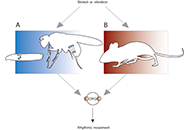 A mechanism for tuning proprioception proposed by research in Drosophila and mammalsOpen AccessReviewProprioception provides important sensory feedback regarding the position of an animal’s body and limbs in space. This interacts with a central pattern generator responsible for rhythmic movement, [...] Read more.Iain HunterPublished: February 21, 2024 Explor Neurosci. 2024;3:27–38
A mechanism for tuning proprioception proposed by research in Drosophila and mammalsOpen AccessReviewProprioception provides important sensory feedback regarding the position of an animal’s body and limbs in space. This interacts with a central pattern generator responsible for rhythmic movement, [...] Read more.Iain HunterPublished: February 21, 2024 Explor Neurosci. 2024;3:27–38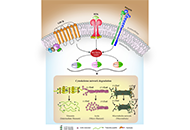 Connecting the ends: signaling via receptor tyrosine kinases and cytoskeletal degradation in neurodegenerationOpen AccessReviewReceptor tyrosine kinases (RTKs) are known to perform versatile roles in disease landscapes, which determine the fate of the cell. Although much has been discussed from the perspective of proliferat [...] Read more.Priyanka Sengupta ... Debashis MukhopadhyayPublished: February 20, 2024 Explor Neurosci. 2024;3:1–26
Connecting the ends: signaling via receptor tyrosine kinases and cytoskeletal degradation in neurodegenerationOpen AccessReviewReceptor tyrosine kinases (RTKs) are known to perform versatile roles in disease landscapes, which determine the fate of the cell. Although much has been discussed from the perspective of proliferat [...] Read more.Priyanka Sengupta ... Debashis MukhopadhyayPublished: February 20, 2024 Explor Neurosci. 2024;3:1–26